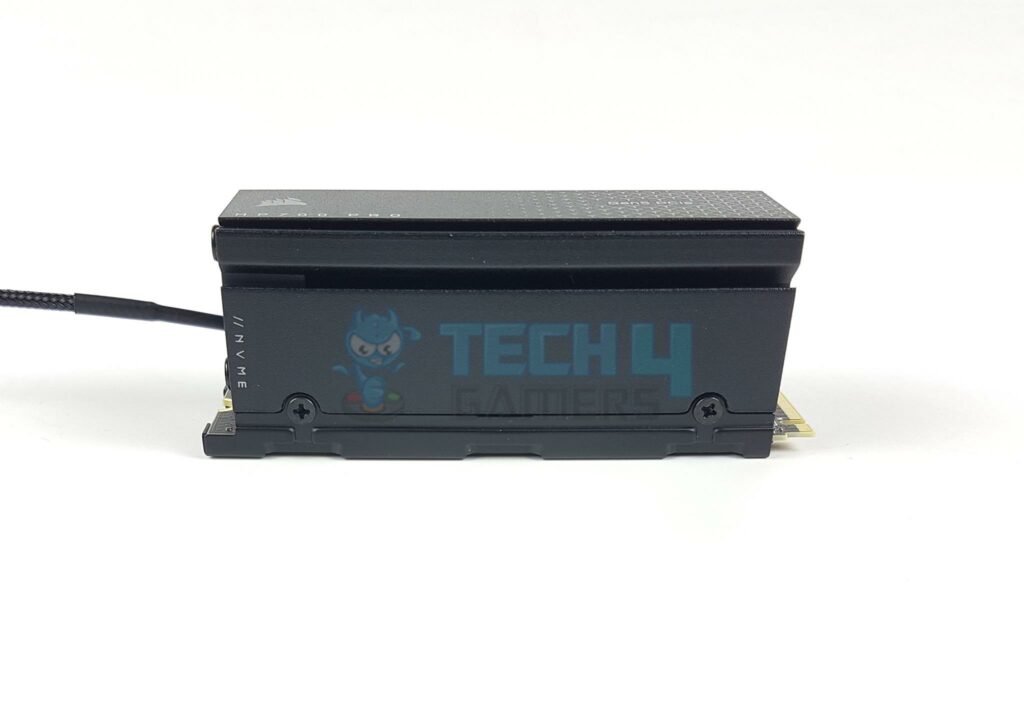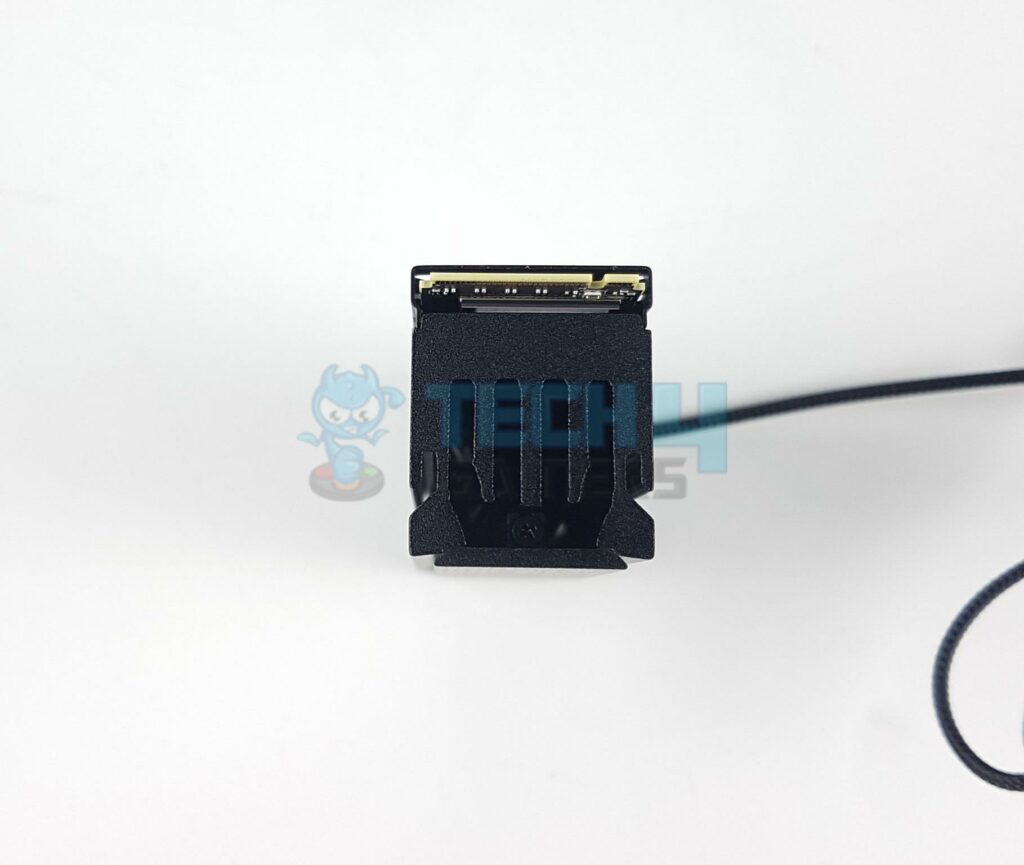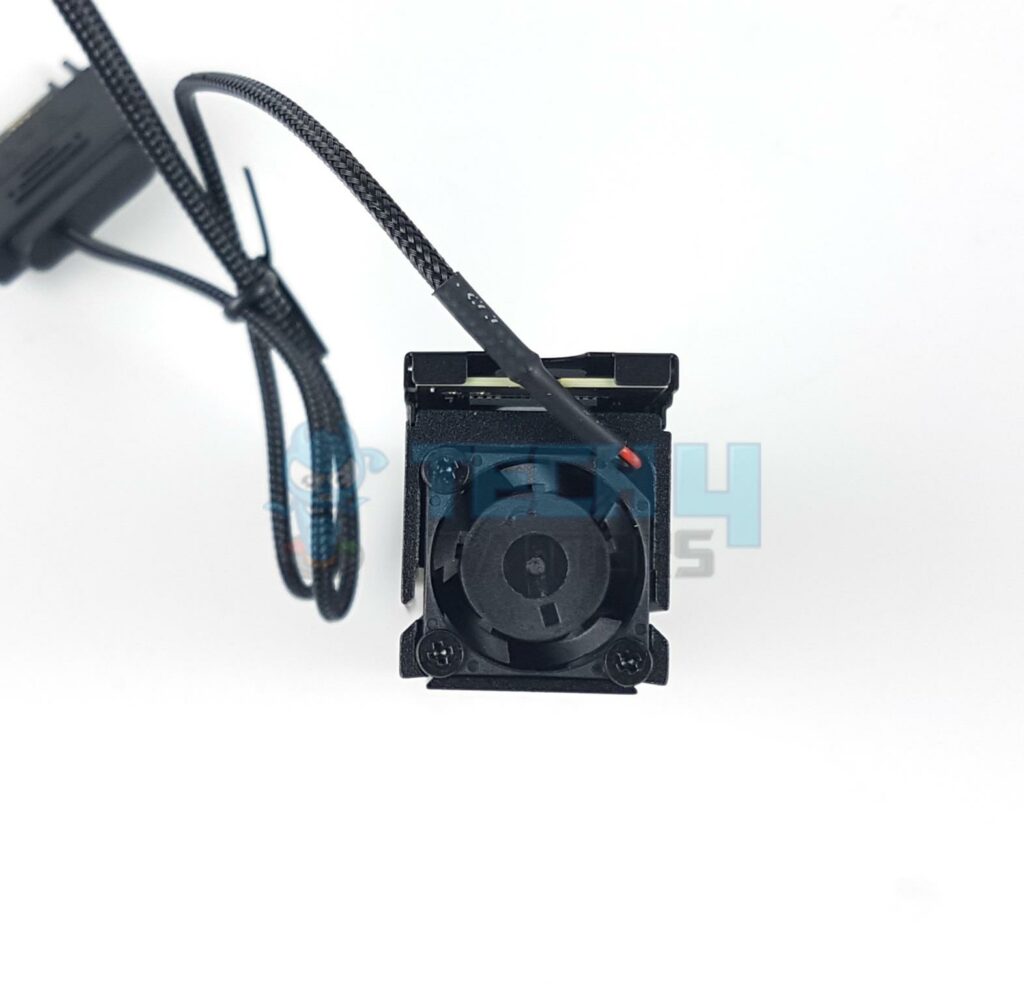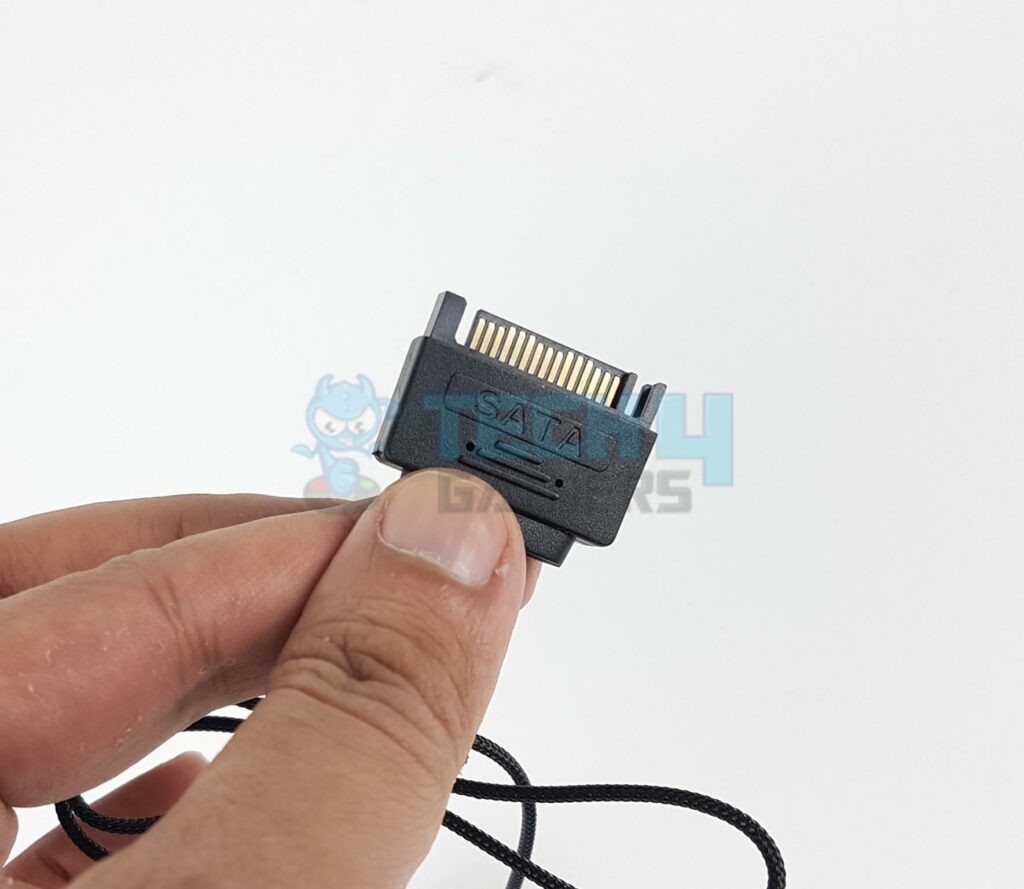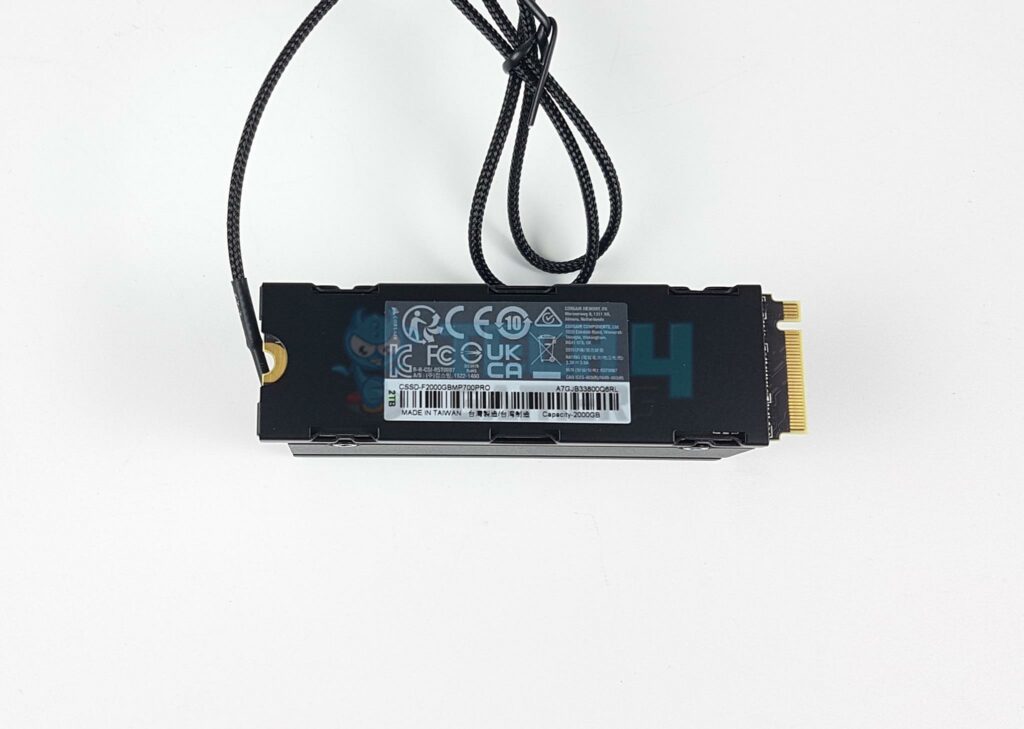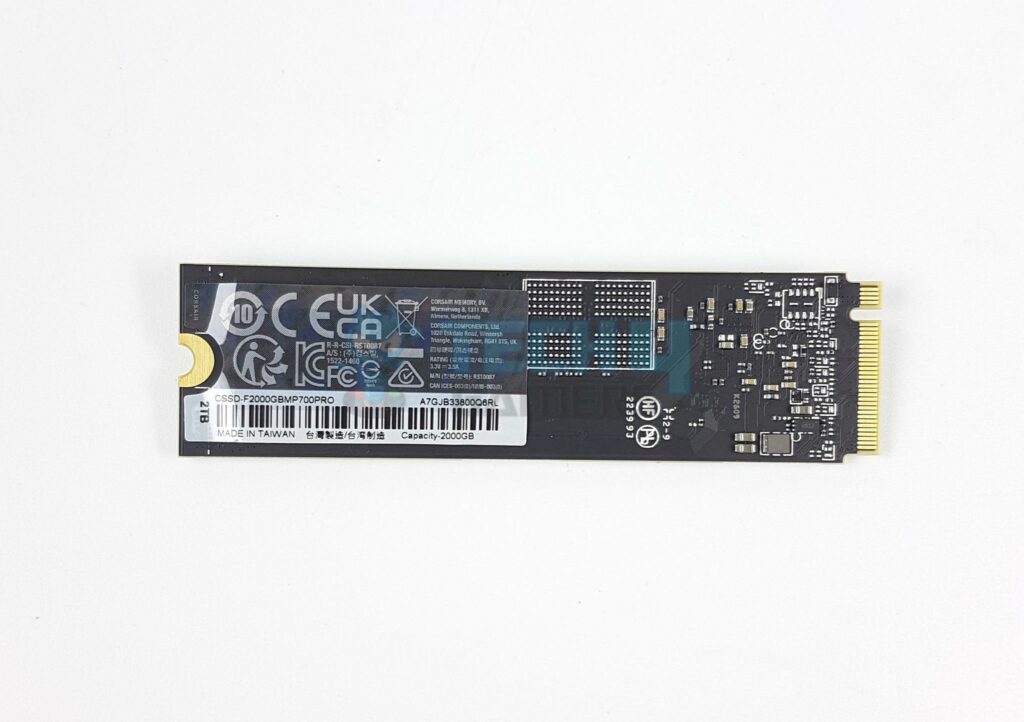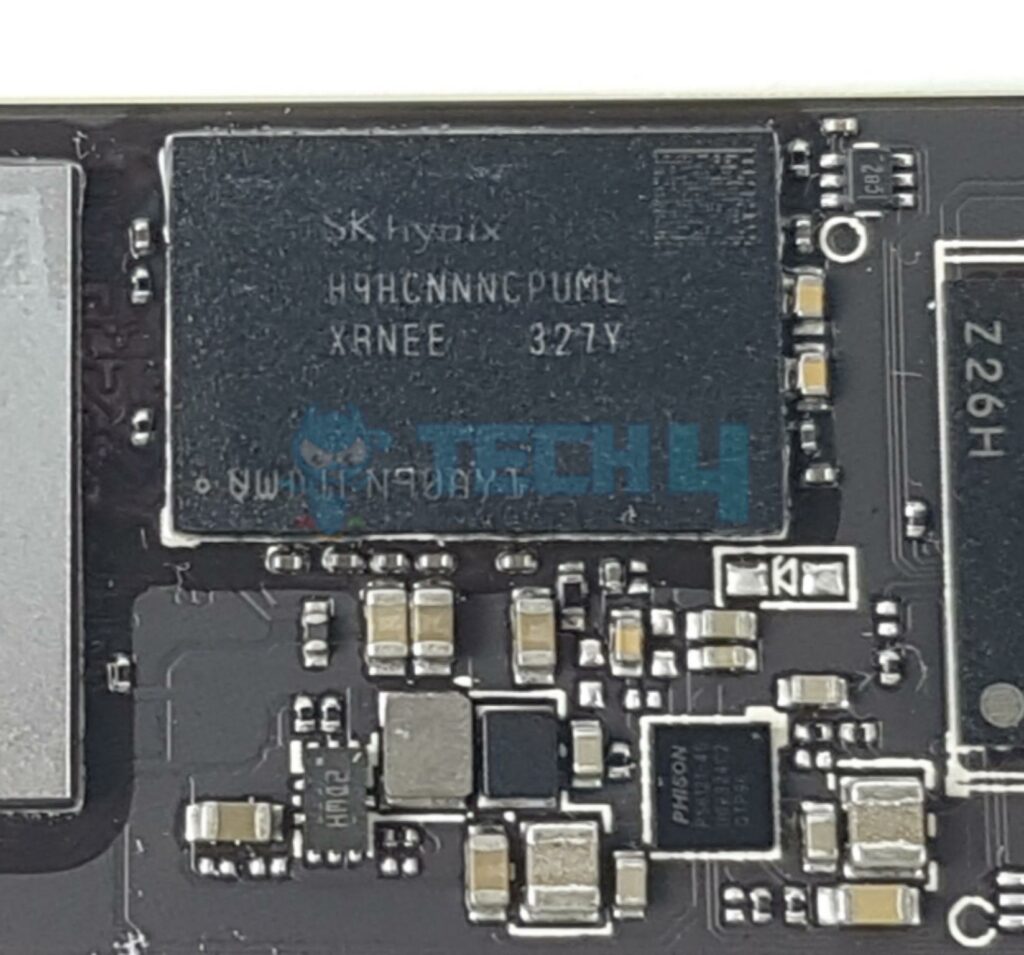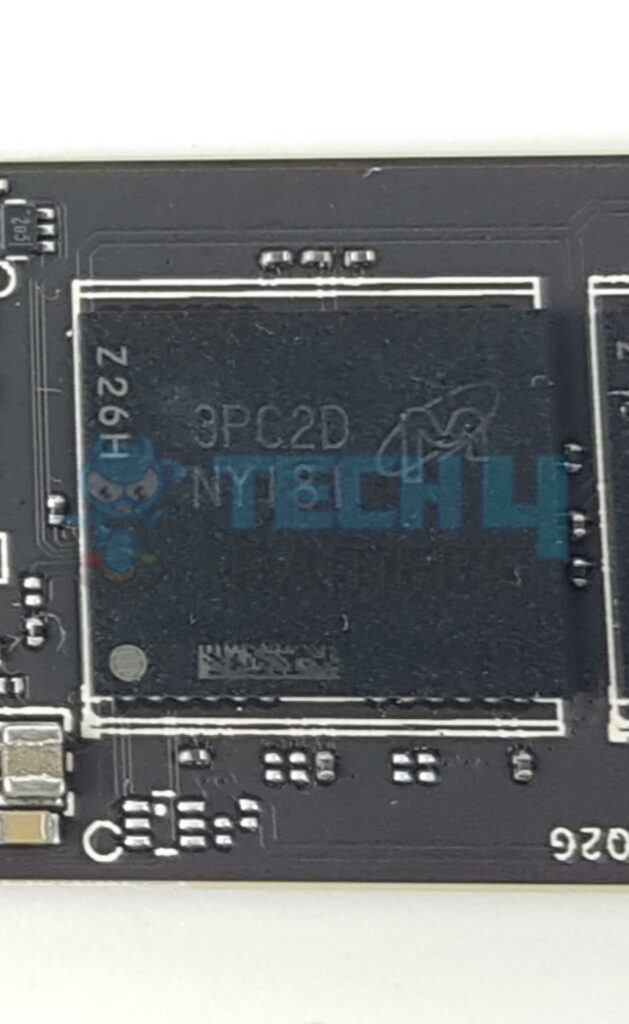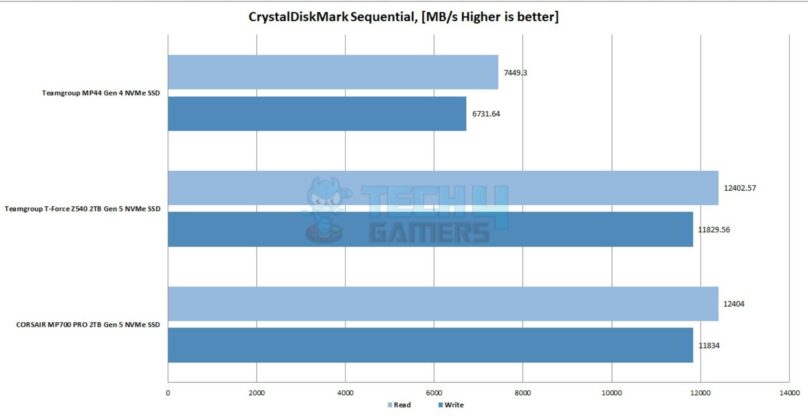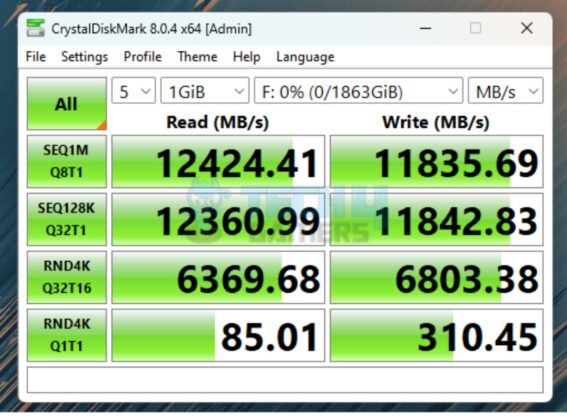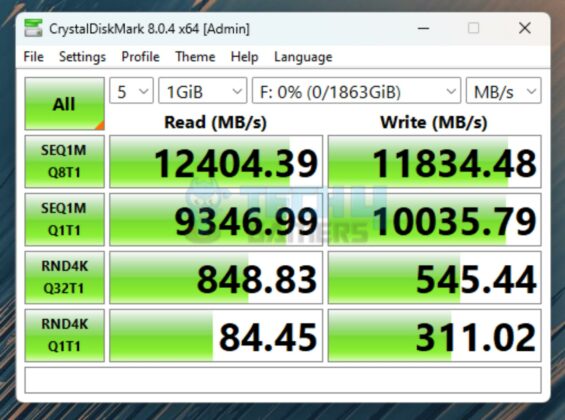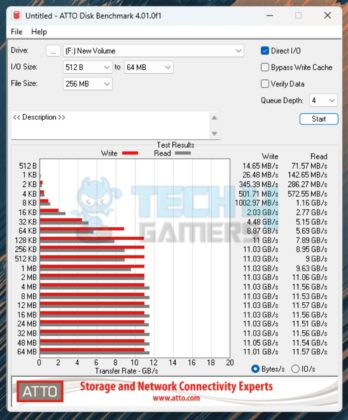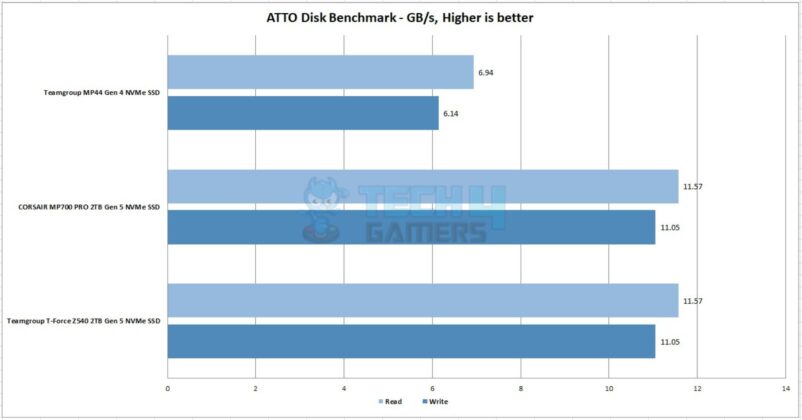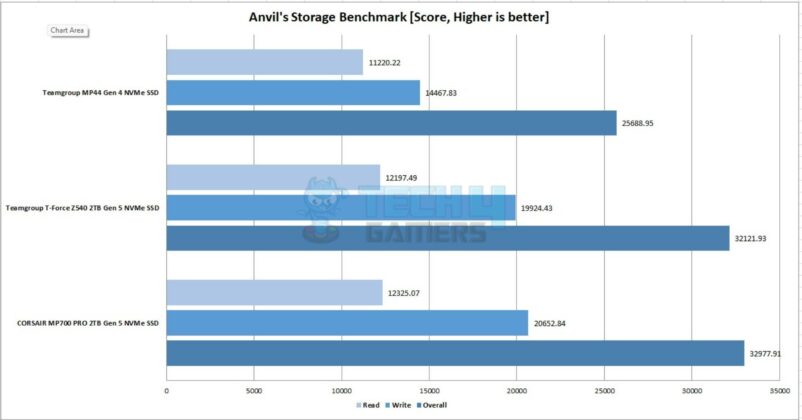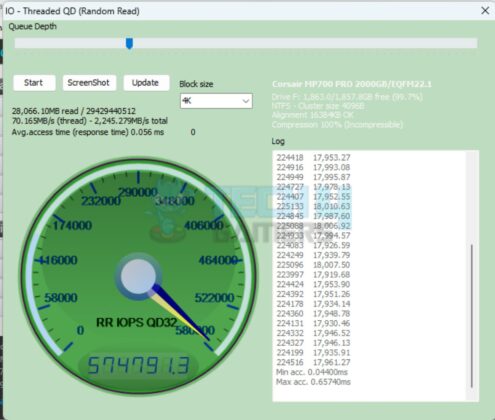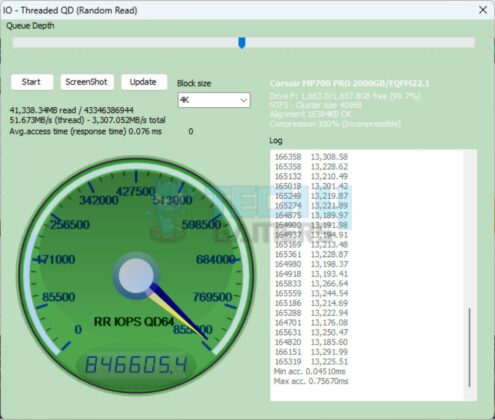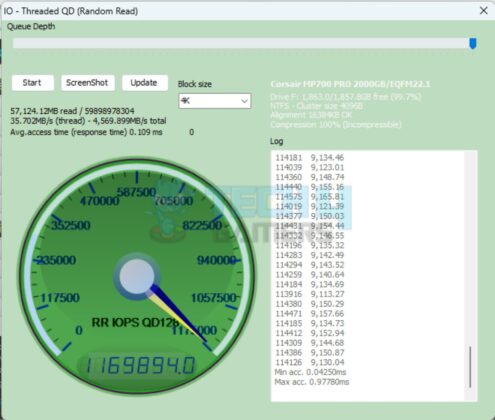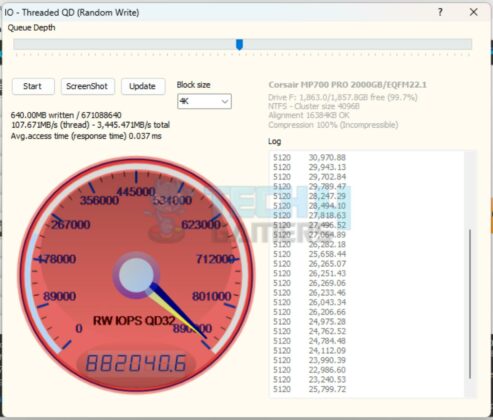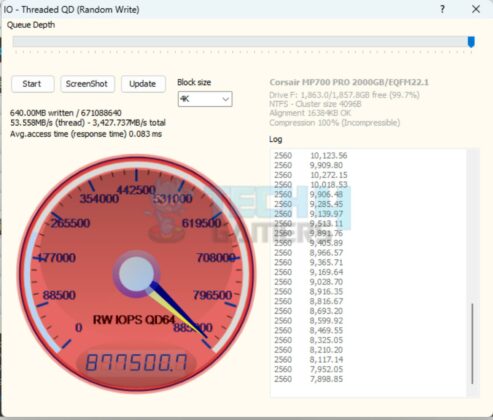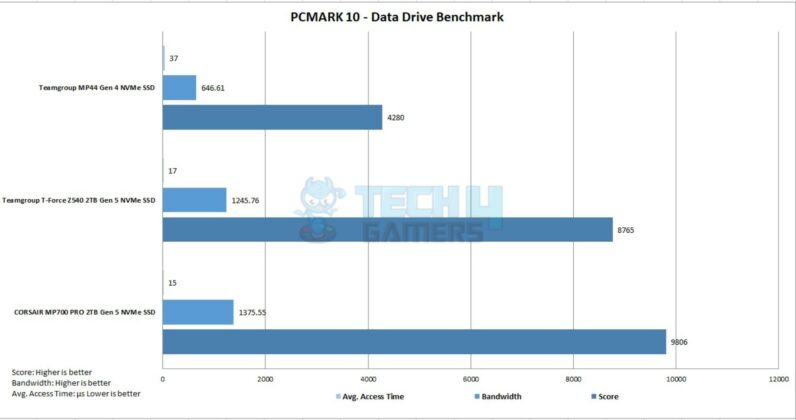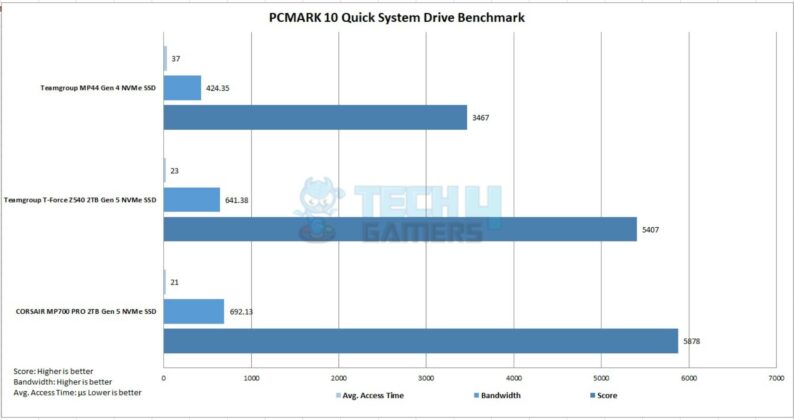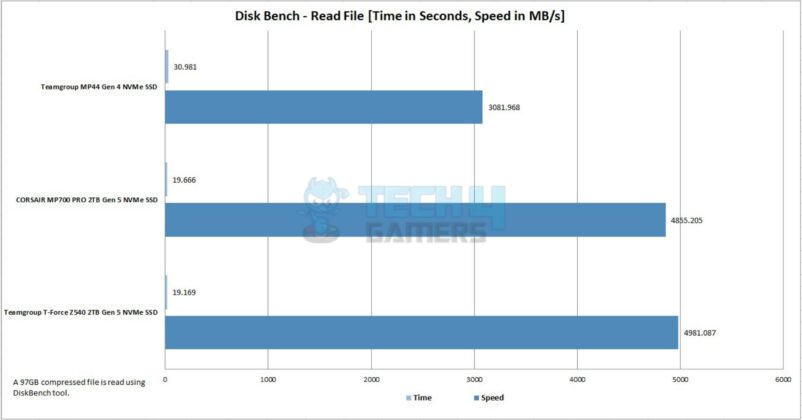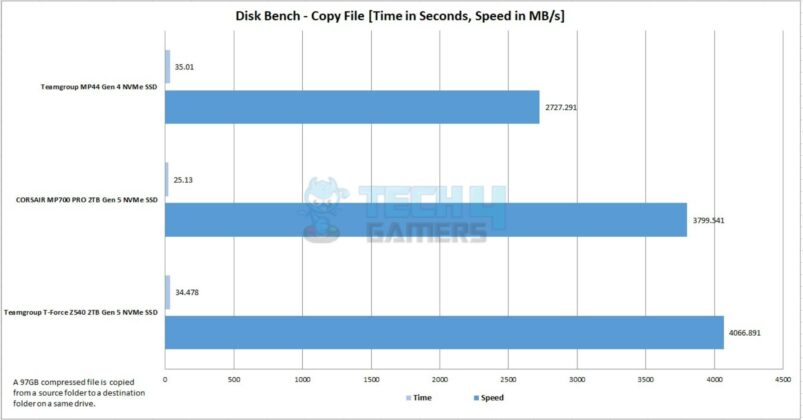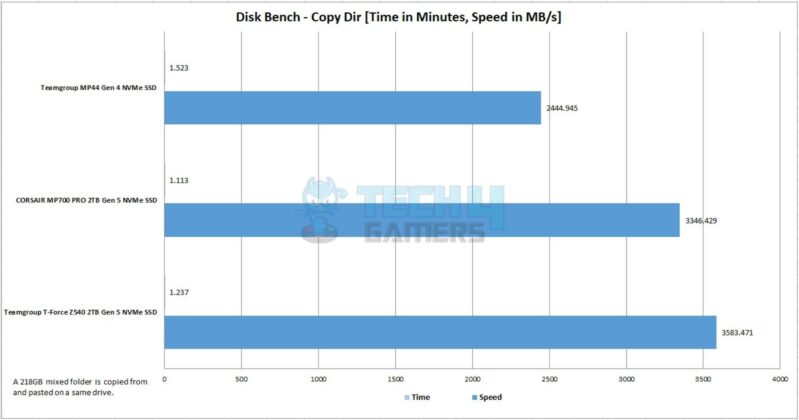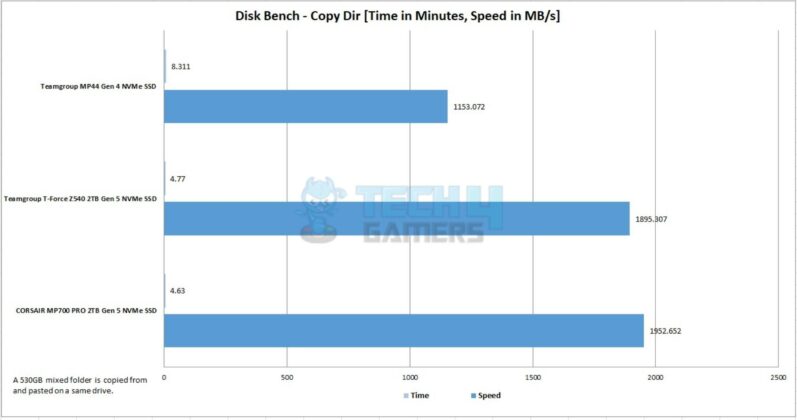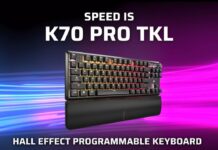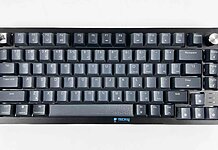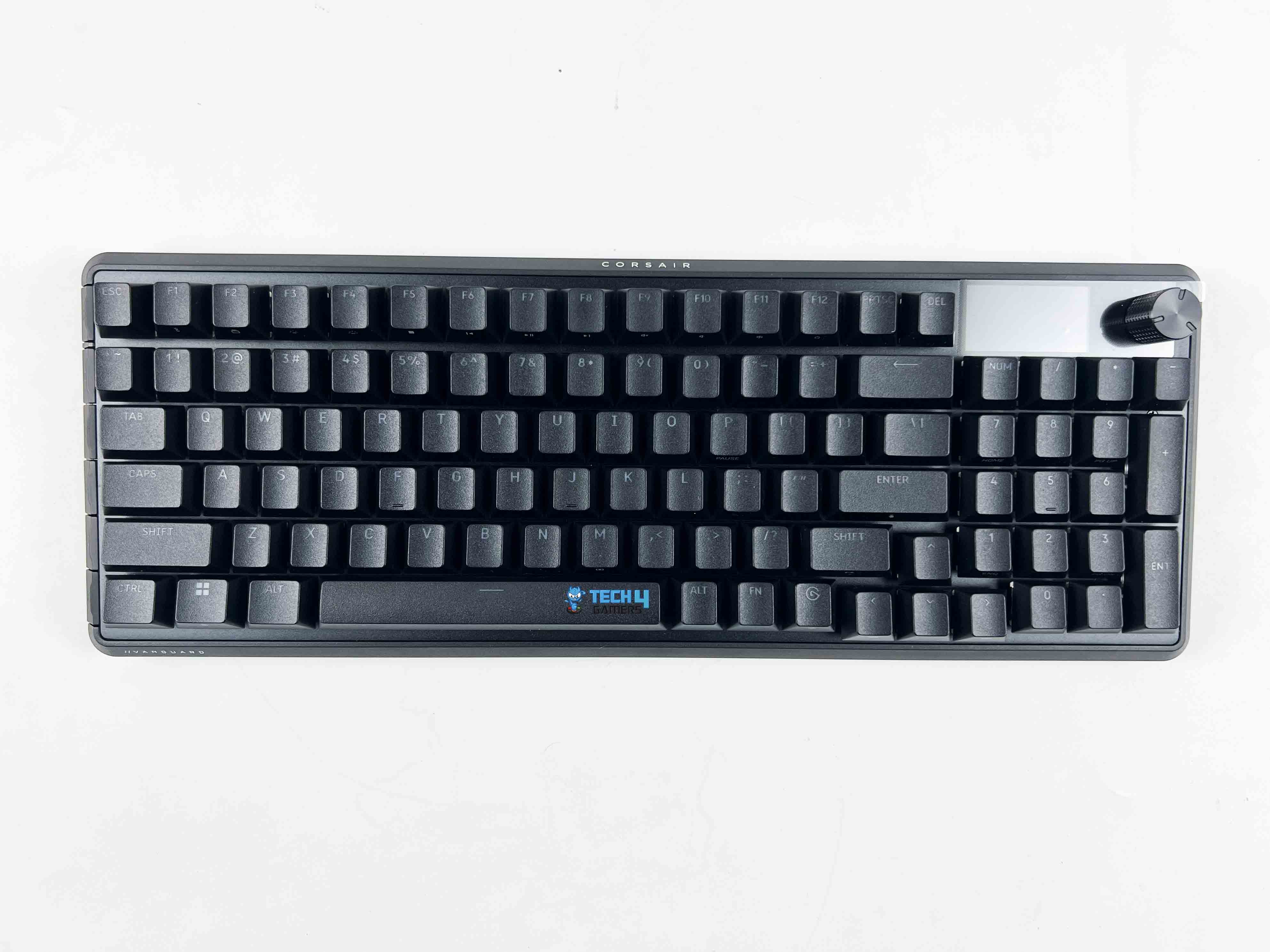Excellent Cooling!
Review Summary
The CORSAIR MP700 PRO 2TB Gen5 NVMe SSD excels in speed and thermal management, offering up to 12400 MB/s read and 11800 MB/s write speeds. Its efficient heatsink with an integrated fan ensures stable performance, making it a top choice for high-speed, reliable storage, especially on Intel platforms. This SSD is ideal for gamers and professionals looking for cutting-edge performance in the Gen5 SSD market.
Overall
-
Quality - 9/10
9/10
-
Performance - 9/10
9/10
-
Features - 9/10
9/10
-
Value - 8.5/10
8.5/10
Pros
- 12400MB/s Sequential Read Speed
- 11800MB/s Sequential Write Speed
- 2280 Form Factor
- 1500K/1600K IOPS in Random 4K
- Microsoft Direct Storage API Support
- Excellent Performance
- Beefy Heatsink with Fan
- Excellent Thermals
- 5-Year Warranty
Cons
- SATA Connector
In the last article, I tested the Z540 2TB Gen5 NVMe SSD from Teamgroup and found it a high-performance drive. This time, I am taking a look at another Gen5 SSD, which is MP700 PRO from CORSAIR. This SSD comes in 1TB and 2TB capacities, and there is a heatsink edition as well as a bare-bone unit.
This 2TB SSD offers a sequential read speed of up to 12400 MB/s and a sequential write speed of up to 11800 MB/s. The Random 4K Read and Write are rated at 1.5M and 1.6M IOPS, respectively, making this drive a bit faster than the Z540 counterpart.
Key Takeaways
- The CORSAIR MP700 PRO 2TB Gen5 NVMe SSD is an excellent SSD with high read and write speeds of up to 12400 MB/s and 11800 MB/s, respectively, and features an efficient heatsink for superior thermal management.
- You should get the CORSAIR MP700 PRO if you want a jack-of-all-trades Gen5 NVMe SSD with top-notch performance and excellent cooling.
- You should not get the CORSAIR MP700 PRO if you are on a budget or want the best bang for the buck.
- Why you can trust Tech4Gamers: Our reviews are based on dedicated hands-on testing by our team of experienced hardware experts. Find out more about how we test.
Let’s start with the specifications.
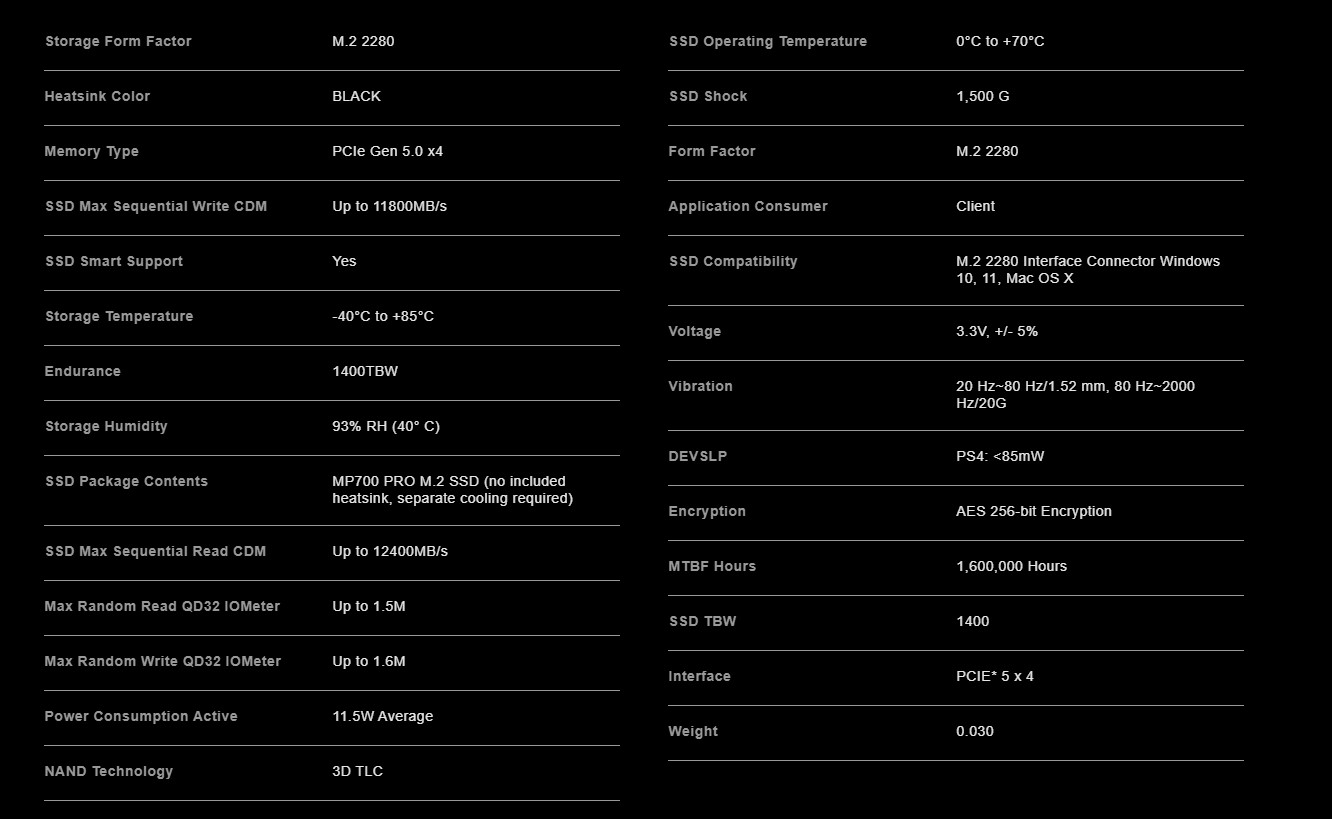
This drive weighs 30 grams and has a form factor of 2280. Its voltage rating is DC 3.3V ±5%. The MTBF is 1,600,000 hours. The MTBF value is a tad less than the Z540 2TB SSD.
Packaging And Unboxing
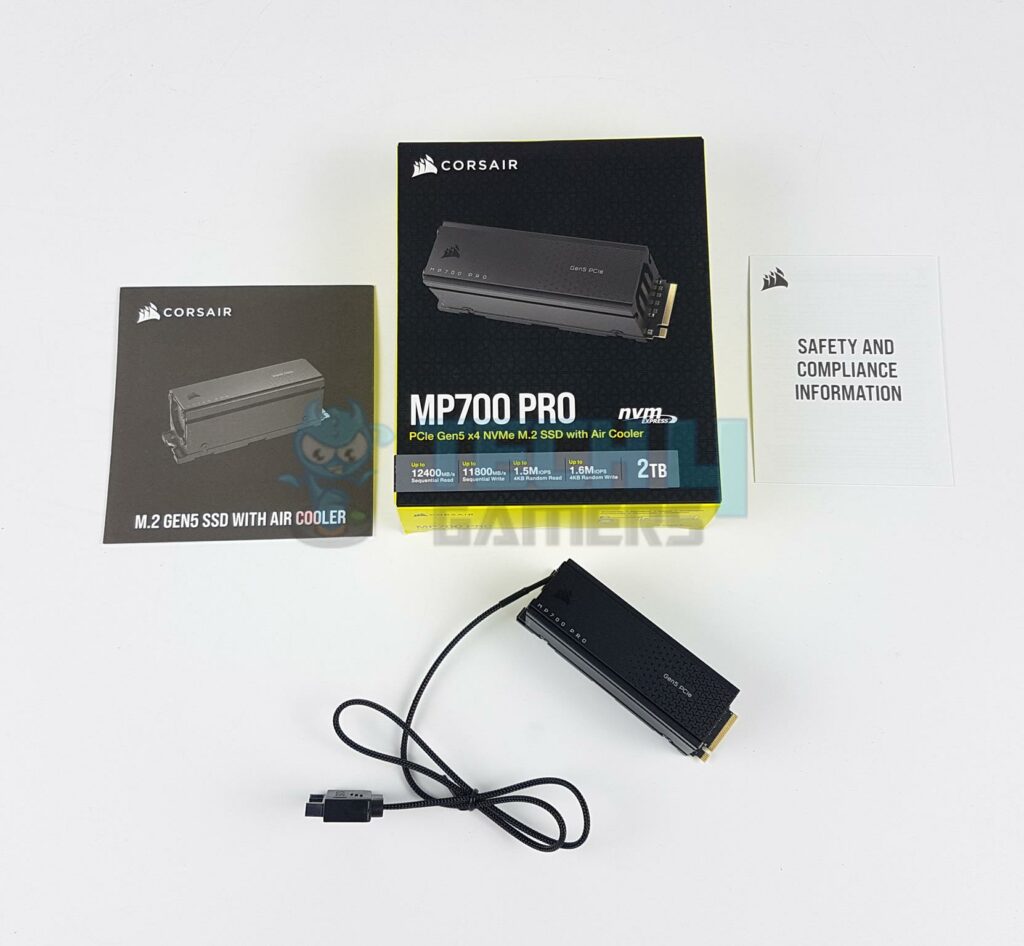
The product is shipped inside a standard paperboard container. The following are provided:
- 1x Drive with Heatsink
- 1x Safety Paper
- 1x User Manual
Design
Let’s start with the salient features of this drive:
- PCIe Gen 5 Speeds
- All-In-One Package for Active Cooling
- Supports Microsoft Direct Storage API
- SATA Connection
- Silent Fan
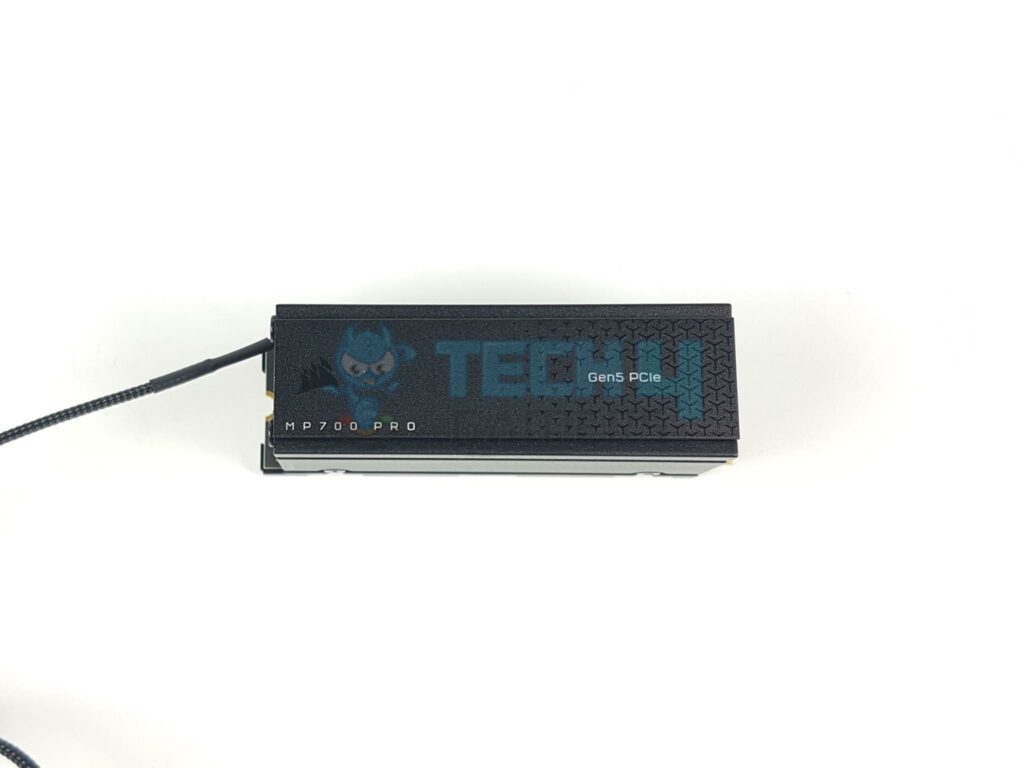
The Teamgroup Z540 SSD is available in 1TB and 2TB sizes, and I am testing a 2TB variant. We have got an SSD+Heatsink combo unit that is sold separately. This SSD is available without a Heatsink as well. This SSD has a dimension of 80x22x3.7mm (LxWxH) conforming to 2280 form factor using M-Key Type for M.2 port. The heatsink has a solid design, and it is black. MP700 PRO and Gen5 PCIe are printed on the top of the heatsink. There is a stylish pattern on one side of the housing, which looks good.
The SSD comes pre-installed on the heatsink. We can see that the base tray is secured to the heatsink main body using 4x screws. There is a good enough surface area on the heatsink for the best possible heat transfer using an active cooling concept.
I am showing the aluminum-made heatsink design in the above picture. We have a large body mass with cutouts acting as heat spreaders to transfer the heat in the ambient. This is achieved using a small fan on the opposite end. We can spot gray color thermal pads as well towards the base of the heatsink.
There is a small-size fan, probably 20mm or so, on this heatsink, secured using 3x black screws. This fan spins to transfer the heat from the surface of the heat sink into the ambient for effective heat dissipation. CORSAIR has used a SATA connector with a slim cable to power the embedded fan in the heat sink. I would have preferred a standard 4-pn connector to regulate the fan’s speed instead. But this fan runs silent, which is a plus.
Looking at the base of the heatsink, we can see a label sticker there showing a part number, serial number, country of manufacturing, and other data about the SSD. I have removed the heatsink and showing SSD from its backside. There is a label over two NAND Flash chips. We can see two empty slots as well. It seems like the same PCB can be used for enhanced capacity in the future. The opposite side has a controller, DRAM chip, and 2x NAND Flash chips.
The SSD comes with a 5-year warranty. The PCB is black. This SSD is based on PCIe Gen 5 and uses 4x PCIe lanes. Their operating temperature range is 0°C~70°C which I am sure is a conservative value. The shock rating is 1500G. The MTBF is 1.6 Million hours.
So, What Is Under The Hood?
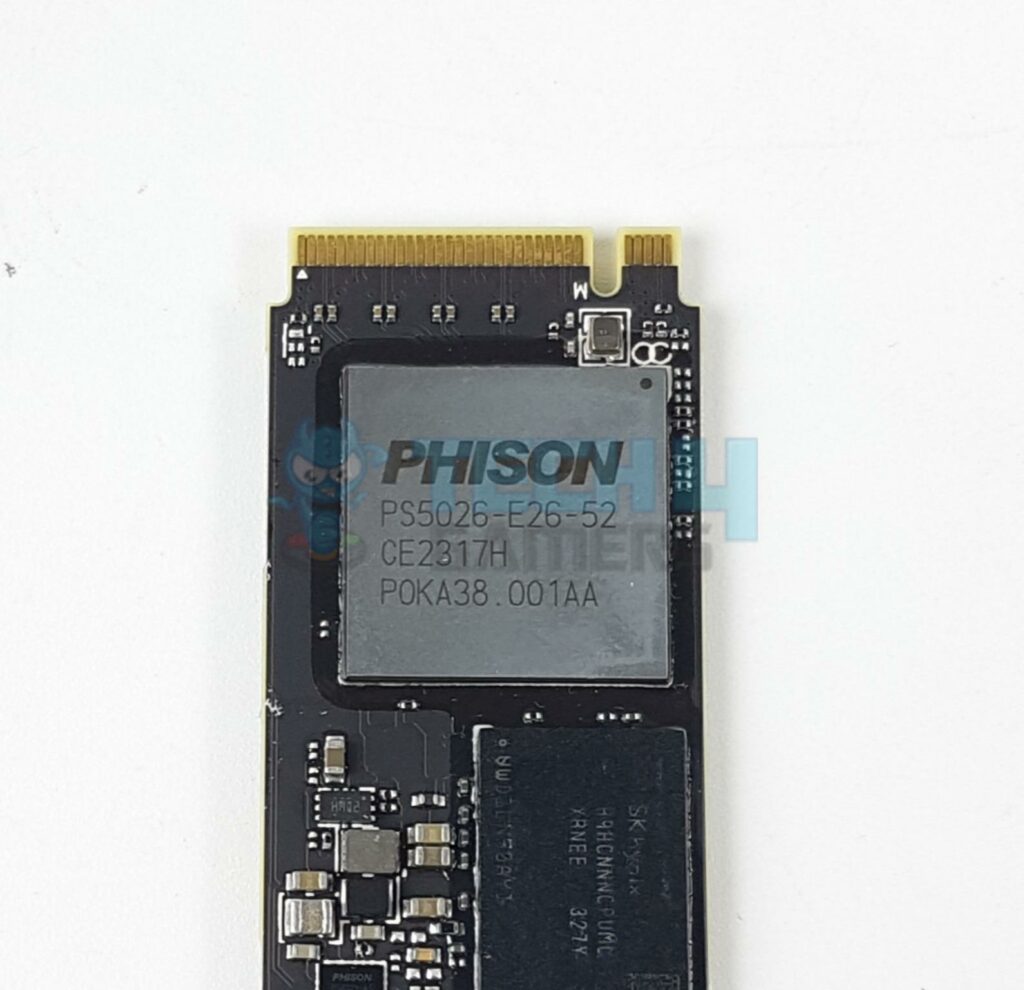
There is practically no difference between the Z540 2TB Gen5 NVMe SSD and the CORSAIR MP700 PRO 2TB Gen5 NVMe SSD in terms of main components. The Corsair SSD has Phison PS5026-E26 controller. This controller supports 8 flash channels on Arm Cortex, and it features NVMe 2.0. At present, this is the main driving force of all Gen5 SSDs.
We can also spot the same Hynix DDR4-4266 chip as is on the Z540 drive. We have a 4GB DRAM chip. This SSD has 4x Micron 232-layer 3D TLC NAND chips, each with 512GB capacity. This SSD has a TBW rating of only 1400 which is similar to Teamgroup Z540 2TB Gen5 NVMe drive.
Testing
Our Intel test bench was down due to a faulty motherboard and PSU, so I tested the drive on the AMD platform. One observation on the AMD platform is that it does not run the drive to its full potential on 4K performance. Here is the test configuration:
- AMD Ryzen 9 7950X
- GIGABYTE X670E AORUS MASTER
- Kingston Fury Renegade 32GB 6400MHz CAS32 DDR5
- ARCTIC Liquid Freezer – II 420
- Sabrent Rocket 4 Plus 2TB NVMe SSD [Data Drive]
- XPG S50 Lite 1TB NVMe SSD [OS Drive]
- ASRock Radeon RX 7600 Phantom Gaming OC 8G [For Display]
- be quiet! Straight Power 11 850W Platinum PSU
- Open-air Test Setup
We have used the following software:
- ATTO Disk Benchmark 4.0
- CrystalDiskMark 6
- Anvil Pro Storage Utilities 1.1.0
- DiskBench
- 3DMARK Storage
- PCMARK10 Storage
- Blackmagic Disk Benchmark
Microsoft Windows 11 22H2 is used for the testing.
It’s one of the fastest Gen5 SSDs, with high 4K Random read/write IOPS ratings.
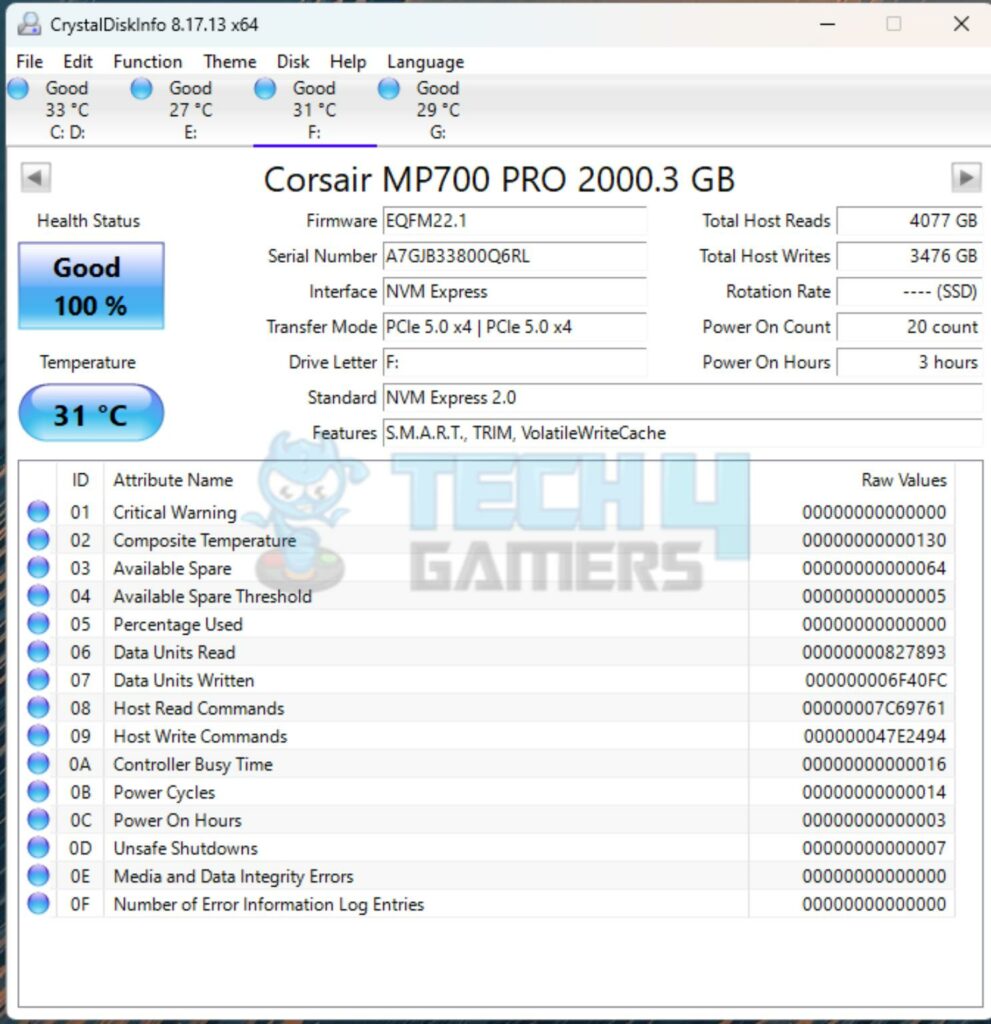
I am showing a run of CrystalDiskInfo above. The firmware of this drive is EQFM22.1. The drive supports NVMe 2.0 over PCIe 5×4.
Test Results
It is time to take a look at the test results, starting with CrystalDiskMark and the ATTO Disk benchmark.
The Teamgroup Z540 2TB drive has a spectacular sequential throughput performance, reaching 12404MB/s and 11834 MB/s in read and write. This is too good. However, we did not see a significant improvement in 4K Random performance on the AMD platform. This is a tad better performance over the Z540 2TB drive. There is no difference in performance from the ATTO Disk Benchmark.
Anvil SSD Benchmark
The drive scored 32977 overall scores with over 7000 performance gains compared to Teamgroup MP44 SSD and almost a 900 score above the Z540 2TB drive. The 4K Performance was lacking on this platform. This drive could only achieve 1169894 IOPS in 128QD using a 4K block size. This is a far better performance compared to Z540 2TB on this same platform. The 4K Write performance was 877500 IOPS. I believe this performance would be the other way around on the Intel platform.
Blackmagic Disk Benchmark
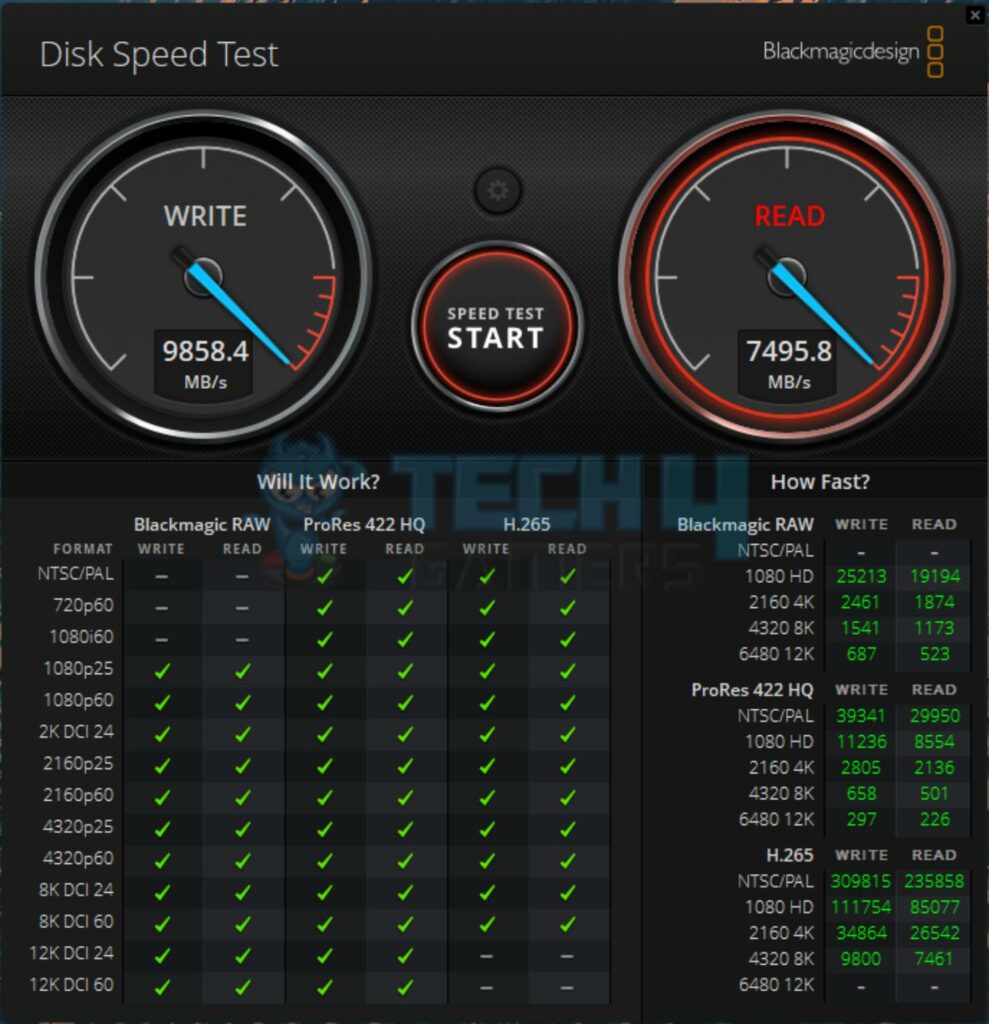
This benchmark is important not only from the speed of the drive but also from the supported formats. This benchmark is quite handy for video workers. I am seeing a similar performance in this benchmark from the CORSAIR drive compared to the Z540 2TB Gen5 NVMe SSD.
3DMARK Storage Benchmark
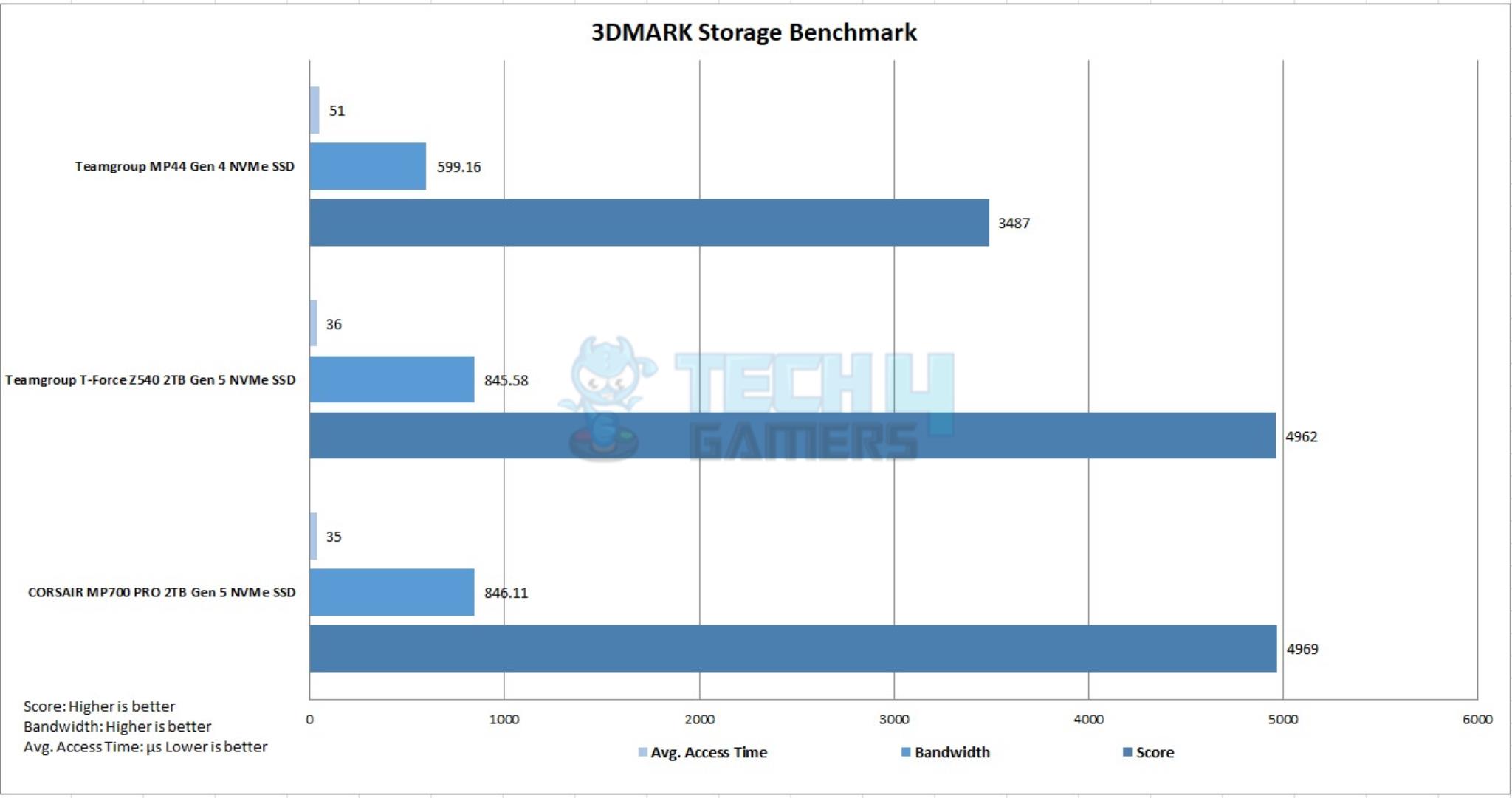
The 3DMARK Storage benchmark does not seem to be ready for Gen5 SSDs. Both Gen5 drives have a similar performance in this benchmark. I note the same observation that I made when testing the Z540 2TB drive. Right after the update, the performance dropped on both drives from 49xx to 37xx.
PCMAKR10 Storage Benchmarks
I ran the Quick System Drive benchmark in which the CORSAIR drive scored a 5878 score compared to the 5407 score of Z540 2TB NVMe SSD. The Data Drive benchmark shows excellent results. The drive scored 9806 scores compared to 8765 on the Z540 2TB. The bandwidth gain on the CORSAIR drive is remarkable as well.
Real World Testing
We prepared a data set of 220GB, approximately including a 97GB highly compressed file. This data was copied to the Teamgroup T-Force Z540 2TB NVMe SSD, and from there, we used DiskBench to perform various operations mentioned below.
All three tests show a good performance gain in the real world, where the time to operate is reduced while the transfer speed is increased. There is a comparable performance from both Gen5 drives, though the Z540 2TB Gen5 drive has a marginal lead.
Thermals
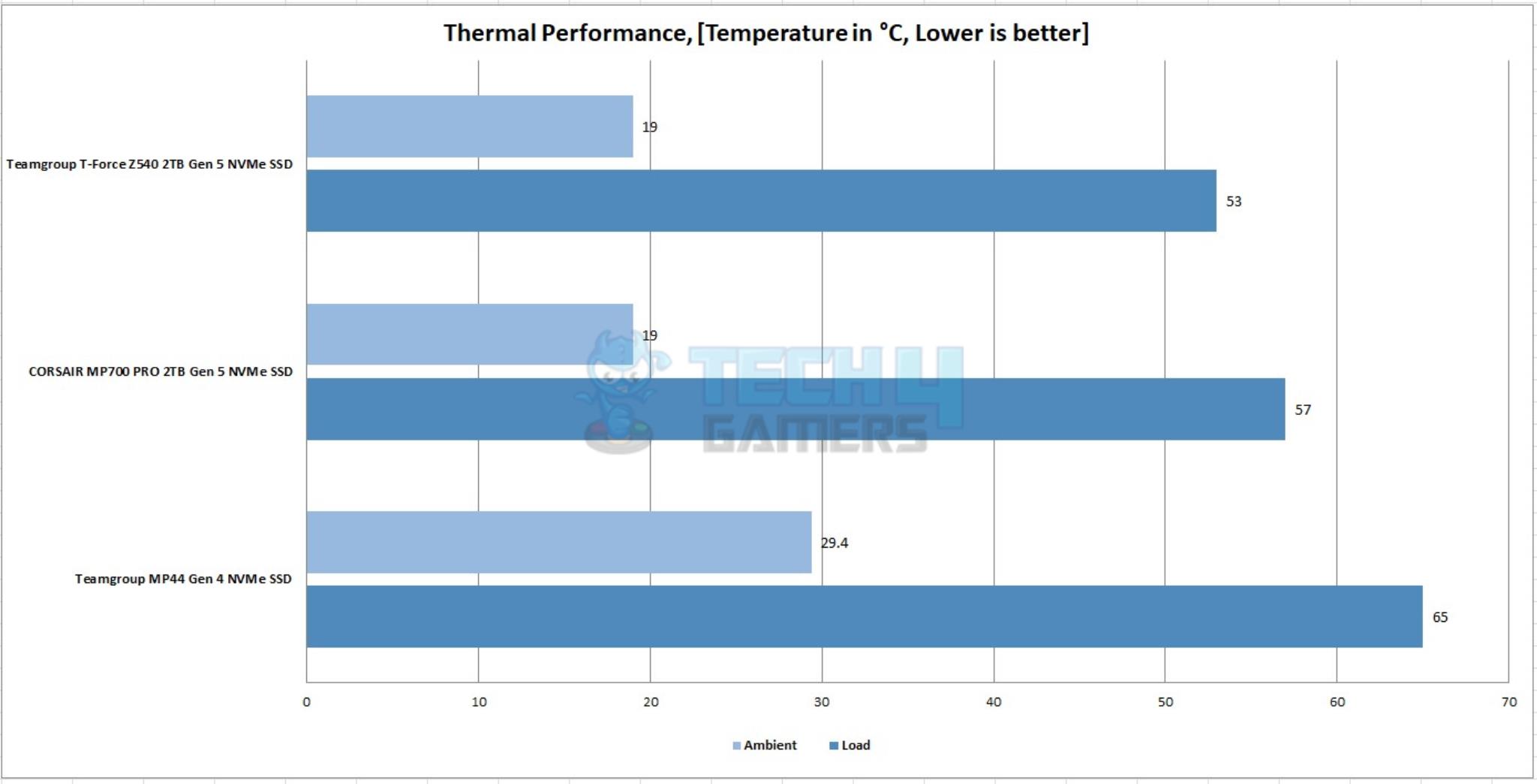
We saw a maximum temperature of 57°C at an ambient temperature of 19°C on this drive. We have no control over the speed of the fan unlike the PWM regulation on the Z540 2TB whose fan seems to have a high speed range to generate more airflow for effective cooling. But at full speed, the fan of the Z540 heatsink runs loud.
Game Load Time Test
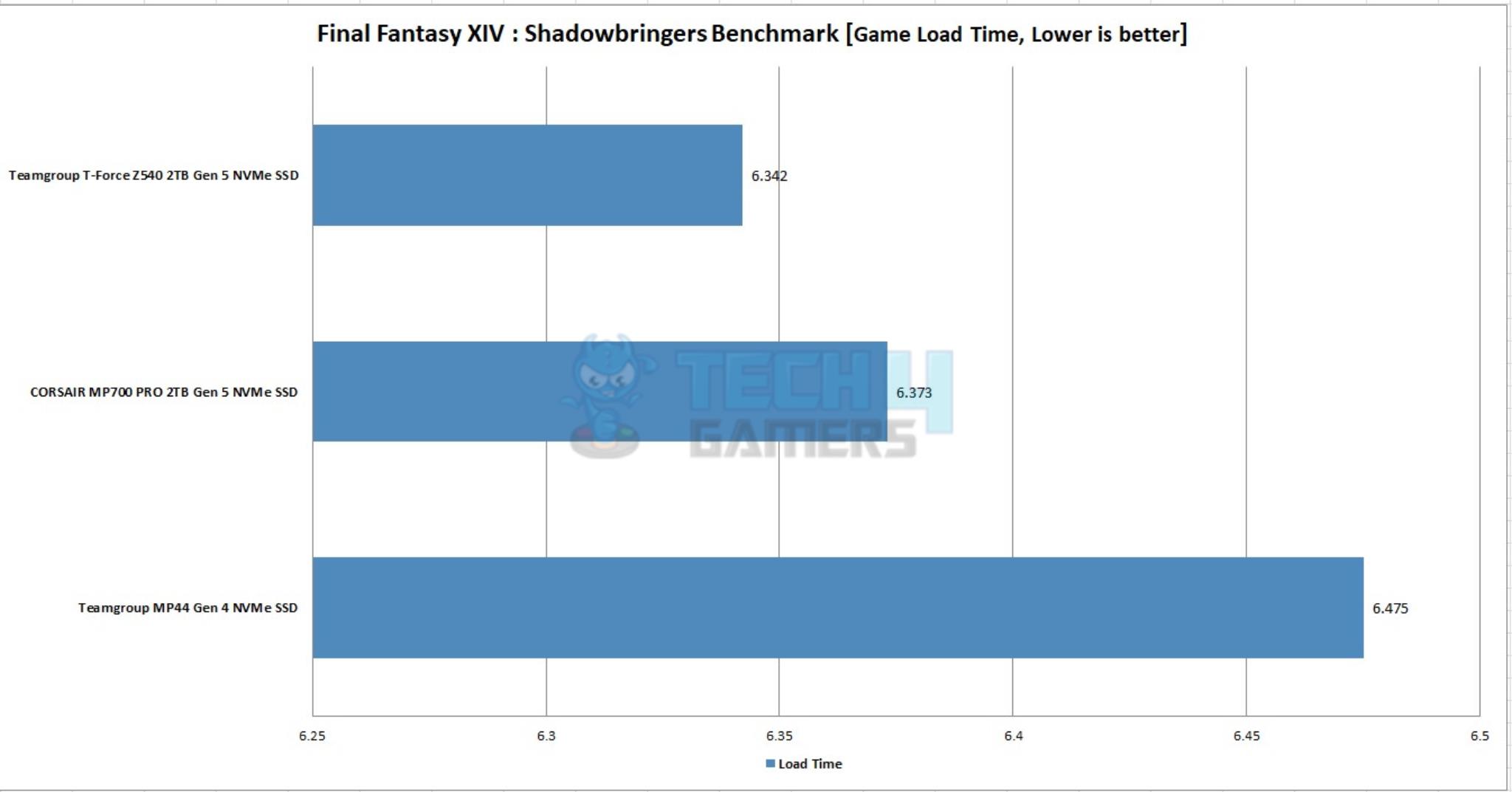
The game load time was measured using Final Fantasy XIV: Shadowbringers Benchmark. It took 6.373 seconds to load the game which is quite well.
Should You Buy It
Should you buy the CORSAIR MP700 PRO 2TB Gen5 NVMe SSD?
Buy It If
✅You are up for a Gen5 NVMe SSD: Right now, almost all Gen5-based NVMe SSDs are utilizing the same Controller. The only difference is from one of two NAND Flash chips from Micron. The CORSAIR MP700 PRO 2TB Gen5 NVMe SSD is among a few listings right now on the market offering blazing speeds.
✅You need an all-in-one Package: We know that Gen5 NVMe SSDs need active or beefy cooling. CORSAIR MP700 PRO 2TB comes with a beefy heatsink with a small size fan that is enough to keep the thermals of the SSD under load in check for sustained performance.
✅You are after a fast storage solution in an NVMe package: The CORSAIR MP700 PRO 2TB Gen5 NVMe SSD delivers top speeds with up to 12400MB/s read and 11800MB/s write, making it one of the fastest Gen5 drives on the market.
Don’t Buy It If
❌You need a bare-bone SSD: If you already have a cooling solution for the NVMe SSD conforming to the M.2 2280 form factor, then this drive may not be for you. But CORSAIR has got you covered. This SSD comes without a heatsink as well.
❌You are on a budget: The Gen5 NVMe SSDs are expensive, as we speak of it. If you are on a budget, you may still consider going for Gen4 NVMe SSDs like MP600 PRO etc.
❌You are looking for the best value Gen5 NVMe SSD: The MP700 PRO 2TB without heatsink costs around USD 299.99, whereas the Teamgroup Z540 2TB NVMe SSD without heatsink will cost you USD 259.99. Both drives have the same components and offer the same 5-year warranty.
Final Words
In this review, I compared the CORSAIR MP700 PRO 2TB with Heatsink against the previously tested Z540 2TB Gen5 NVMe SSD. Both drives, sharing the same components and Phison E26 controller, offer comparable performance in terms of speed and efficiency. The standout features of the CORSAIR MP700 PRO include its large, black heatsink that enhances heat dissipation, contributing to its position as one of the fastest Gen5 NVMe SSDs available.
The CORSAIR MP700 PRO is offered in 1TB and 2TB variants, with the 2TB model boasting impressive sequential read and write speeds of up to 12400MB/s and 11800MB/s, respectively. It also delivers robust 4K Random performance. However, its performance on AMD platforms is slightly limited, particularly in 4K metrics, a gap that is less pronounced on Intel platforms.
While both SSDs have similar Total Bytes Written (TBW) values, the CORSAIR’s effective heatsink, which includes a non-PWM regulated fan powered by a SATA connector, stands out. This design choice, though it adds to cable management considerations, ensures better thermal performance under load. In synthetic tests, the CORSAIR marginally outperforms the Z540, but real-world tests show a slight edge for the Z540.
Ultimately, the decision between these two SSDs may come down to factors like warranty support, sustained performance, and customer service, in addition to their technical specifications and thermal management features.
Coming Up: Sabrent Rocket 4 Plus G 2TB NVMe SSD Review
Thank you! Please share your positive feedback. 🔋
How could we improve this post? Please Help us. 😔
[Hardware Reviewer & Editor]
Meet Nauman Siddique, a highly experienced computer science graduate with more than 15 years of knowledge in technology. Nauman is an expert in the field known for his deep understanding of computer hardware.
As a tech tester, insightful reviewer, and skilled hardware editor, Nauman carefully breaks down important parts like motherboards, graphics cards, processors, PC cases, CPU coolers, and more.
- 15+ years of PC Building Experience
- 10+ years of first-hand knowledge of technology
- 7+ years of doing in-depth testing of PC Hardware
- A motivated individual with a keen interest in tech testing from multiple angles.
- I majored in Computer Science with a Masters in Marketing
- Previously worked at eXputer, EnosTech, and Appuals.
- Completed Course in Computer Systems Specialization From Illinois Tech


 Threads
Threads
